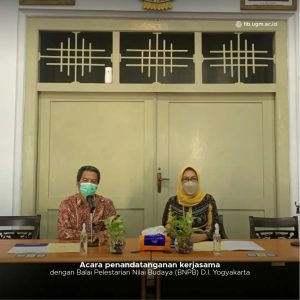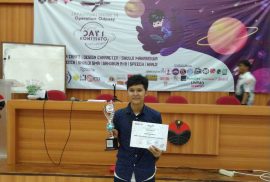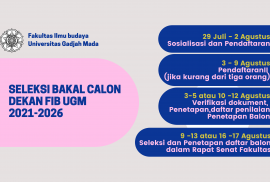News Release
On April 14th, 2022, La Rochelle University and the Cultural Attache of the Embassy of France visited the Faculty of Cultural Sciences at Universitas Gadjah Mada.
Welcomed by the Dean, Vice Dean of Research, Community Services, Cooperation, and Alumni Affairs, Vice Dean of Finances, Assets, and Human Resources, and the Head of the French Literature Programme, the visit discussed the potential for cooperation, both for academic staff exchanges and student exchanges.

On April 26th, 2022, at Pendapa Dalem Jayadipuran, Balai Pelestarian Nilai Budaya (Bureau of Cultural Values Conservation/BNPB) D.I. Yogyakarta signed a memorandum of understanding with the Universitas Gadjah Mada Faculty of Cultural Sciences.
The MoU is a part of FIB UGM’s efforts to create synergy between the Faculty and partners in order to realize the Ministry of Education, Culture, Research, and Technology’s “Merdeka Belajar Kampus Merdeka” vision: to provide students with opportunities to sharpen their skills and interests, preparing them for the future workforce.
FIB UGM’s envoy was welcomed by the Head of BNPB D.I. Yogyakarta in the Assembly Hall, who proceeded to explain the role of BNPB D.I.Y.. The MoU was signed by the Head of BNPB D.I.Y., Dwi Ratna Nurhajarini, M.Hum. and the Dean of the Faculty of Cultural Sciences, Dr. Setiadi, M.Si..
The Japanese Literature Programme of the FCS, Universitas Gadjah Mada, once again proves its achievements. Akbar Rizqi Dhea Habibi, or Rizqi, achieved the 2nd place on the Universitas Pendidikan Indonesia Shuuji Contest on April 6 2019.
Previously, Rizqi has already won several competitions in the same field. Yet, he noted that on this occasion, the competition was exceptionally competitive. “The previous Shuuji Contests I attended this time has more diverse participants from Javanese universities, and all of them wrote very beautifully. I was quite nervous and trembled a bit when I wrote.” said Rizqi.
Even though he only got the 2nd place, Rizqi successfully placed better than other contestants, who came from East Java to West Java. The 1st place went to a contestant from STBA YAPARI ABA, and the 3rd place went to a contestant from UPI.
This competition is a part of the annual Japanzuki Show, an annual event held by Himpunan Mahasiswa Bahasa Jepang (HIMABAJA) UPI, under the supervision of Departemen Pendidikan Bahasa Jepang UPI. This event is held in order for those interested in Japanese language and culture to be creative and exchange knowledge on Japanese culture and language.
Rizqi hopes to see more of his juniors interested in competitive Shuuji in the future.
- 29 July – 2 August: Socialization and Registration
- 3 – 9 August: RegistrationII (if less than three people)
- 3-5 or 10 -12 August: Document verification, Assignment, Balloon Assignment Assignment
- 9 -13 or 16 -17 August: Selection and Determination of the list of candidates in the Faculty Senate Meeting





On Thursday, April 28, 2022, the Faculty of Cultural Sciences has signed a MoU with the Vredeburg Museum, after previously holding a virtual meeting on Wednesday, April 20, 2022.
The signing was attended by the Dean of FIB UGM, Dr. Setiadi, M.Si. and the Head of Vredeburg Museum, Drs. Suharja.